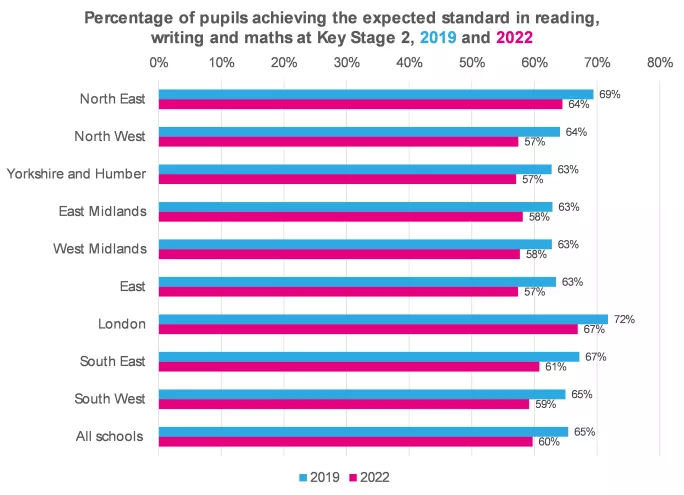Just 1 per cent of schools achieved the government’s national ambition for 2030 of having 90 per cent of pupils reaching the expected standard across key stage 2 Sats tests, new analysis shows.
Earlier this year, the Levelling Up White Paper revealed the government’s ambition for 90 per cent of pupils to be meeting the expected standard in KS2 reading, writing and maths by 2030.
New FFT Education Datalab analysis of 2,500 school results for this year shows just 1 per cent had 90 per cent of their pupils achieving this.
Dave Thomson, the author of the research and chief statistician at FFT, said the findings revealed ”the scale of the challenge the government has set itself”.
Mr Thomson said the analysis also suggested that ”some regions have been slightly more affected than others” by the effects of the Covid pandemic. The FFT data provides a regional breakdown of outcomes.
As part of FFT’s 2022 Early Results Service, it collected KS2 results from over 2,500 primary schools and linked this to published 2019 data for those schools that were open back then.
While 59 per cent reached the expected standard in reading, writing and maths nationally, a fall the former schools minister Robin Walker described as “disappointing but expected”, the FFT has revealed how the picture varies across the nation.
Its new analysis has suggested that the North West experienced the largest drop in the number of pupils achieving the expected standard, with a fall of 7 percentage points between 2019 and 2022.
The percentage of pupils achieving the expected standard in this region fell from 64 per cent in 2019 to 57 per cent this year.
Yorkshire and the Humber and the East also fell to 57 per cent, dropping by 6 percentage points.
The analysis shows that attainment fell by less than 5 percentage points, not only in London and the North East - the two highest attaining regions in 2019 - but also in the East Midlands - one of the lowest attaining regions in 2019.
In maths assessments, the East Midlands and London recorded the smallest change in the mean scaled score, with just 0.8 and 1 score point respectively, with attainment falling again by the largest amount in Yorkshire and the Humber (1.5).
Mr Thomson highlighted that the Year 6 absence rate in London and the East Midlands was lower than in the other regions of England.
The FFT also did an analysis of how the distributions of test scores have changed since 2019 based on a sample of 1,500 schools that shared 2019 data with them.
This showed that nearly a third (31 per cent) of schools saw improved attainment between 2019 and 2022, while half of schools saw a fall of 6 percentage points or more.
This year’s KS2 Sats were the first to take place since the summer of 2019 as a result of the Covid pandemic.
Following the publishing of the interim results earlier this month, Mr Walker said the government “recognises and values the work that teachers up and down the country are putting into education recovery” but there was “more work to do”.
A Department for Education spokesperson said the department recognised pupils that have missed “a critical period of their education due to the pandemic” and the government was now “driving forward work” to get pupils “back on track”.
The spokesperson referred to the National Tutoring Programme which provides “targeted support for whole areas of the country where standards are weakest”.
“This work is being taken forward at pace and we know children are already making strong progress with their recovery.
The spokesperson said that not adapting this year’s KS2 tests had ensured “consistency” and “an important baseline from which to measure the impact of the pandemic and pupil’s progress over the coming years”.





